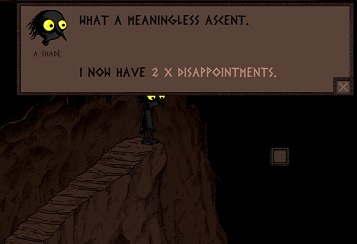Hey! Listen!
October 27, 2025
Recently, a friend of mine gifted me the game “The Longing”. The Longing is a game where an ancient king falls dormant, and tells you to wake him up after 400 days. Not 400 game days, 400 actual, real world, real life days. For the rest of the time you wander around the caves of the kingdom, collecting trinkets and watching your player character slowly wander around the empty caves.
The Longing is an absolutely miserable game. I don’t think it’s on accident, to be clear, the game is intentionally slow in all of its behaviours and puts into question what you’re even doing with your time. One of the game’s eras is The Hall of Eternity, an infinite room where you can just keep walking rightward, eternally, trying to find the end. If you wanna leave the eternal halls, you need to walk leftward as much as you did right. To add insult to injury, time stands still within the halls, meaning that walking there doesn’t even progress the 400 day clock you’re waiting on. It’s a complete waste of time.
Is it a good game? Possibly. People seem to really enjoy it and the message it conveys, and your interaction with the game is a core part of the experience. It uses time very well, which is something I’ve discussed on this blog before. I can respect its merits as an artistic piece.
However, I didn’t like it at all. I felt like it was way too heavy handed with its messaging and would have benefitted from shutting up occassionally; your little guy constantly comments on how pointless your actions are, which is a sentiment the gameplay already conveys well. Like, cool dude, I didn’t need you to tell me it’s dissapointing to find a locked door after 20 minutes of pacing in dark rooms, I already felt that as a person.

I think Arin Hanson puts it well when he discusses Ocarina of Time’s storytelling:
It’s this kind of misdirection of like what you should care about in Zelda that really bugs me about [Ocarina of Time]. Like, let’s take its story for example: Ocarina’s story provides you with a context to your quest, that accomplishing this will save this or change this, but it refuses to acknowledge the player’s innate sense of wonder and… and drive to quest and fight. Players wanna fight bosses, they wanna be rewarded for their efforts, they want to enter a dungeon, see what’s inside, and succeed against enemies.
[…]
I think the idea that you’re a hero saving a kingdom is atleast somewhat unnecessary. When it’s an order delivered by the game, it becomes a task, it’s like a job. The message should be that, as a player, your idea of fun ends up making you a hero.
[…]
A book can tell you the main character’s a hero with dialogue, a movie can too, but a game? In a game you can feel it.
Centrally, his point is that the inclusion of story elements may end up devaluing a game’s experience if they overlap with the player’s intrinsic motivations. If a player feels a certain way, and then the character turns around and tells them “hey, you should feel this certain way!”, it reminds the player that this experience is artificial and makes their own experience a little less meaningful.
There’s a pretty well known experiment from 1975, where a group of researchers gathered two groups of children, aged 3-5, and told them to draw. One group was paid per drawing, and the other was not. Beyond the differences the two groups had in methodology, the study showed that this external incentive made the children less likely to draw for fun between parts of the experiment. The unpaid group kept drawing because they found it to be its own intrinsic reward, while the latter lost that intrinsic motivation and just stared at the ceiling waiting for the next parts. Giving players more rewards for something they already want to do can paradoxically make them less likely to repeat this behaviour.
This is the reason I brought up the Endless Hallway, actually; I think it’s a very good example of creating the intended experience through gameplay. I didn’t need to walk in that hall for 30+ minutes, the game warned me it’d stop the clock. But I did anyways. Hoping there may be some reward. But there wasn’t. I just wasted my time for no good reason, and then had to walk back. It made me feel that sense of futility in a much more meaningful way because I was the one who did that. The game didn’t lecture me on how awful this all was, it just let me soak in the moment.
(Well, that’s a lie. The little guy kept going “wow! this sure is long!” and “yknow, maybe I should turn around” for the first 5~ minutes. I preferred it when he stopped talking.)
So far I’ve only got one hour clocked in the game. I think I’ll give it some more time, but that’s my first impressions so far: it’s a game that misses the target on its intended experience, and ends up being a game that’s more fun to discuss that it is to play. I’ll still invest some more hours into it just to see what else the game has to offer, maybe it’s just the early game that’s this heavy-handed with its messaging. At worst, I’ll have a better grasp on what I like and not like in games.
I left my little guy to read Moby Dick yesterday. (oh yeah, there’s public domain books you can let your guy read. Like, the whole thing.) I’ll see if he finished reading it.
